- Home
- John Ellsworth
30 Days of Justis Page 2
30 Days of Justis Read online
Page 2
At C3 it hits me head-on.
I'm going to be a father yet again.
Another chance at the one job that always leaves me feeling inadequate. So far I've done a passable job with Dania, Mikey, and Annie. Nothing to write home about but nobody's called the cops on me, either. They haven't missed out, and I have no regrets. But it hasn't been easy. A friend of mine in law school once said that the semester exam on property law was like being handcuffed and rolled up in chains and tossed into the North Atlantic Ocean's stormy night. So alike being someone's dad. It never fails to humble me.
Fathering children is about chemistry and biology inspired by lust.
Parenting them, on the other hand, is a whole other North Atlantic.
I am ashamed of those things I did. I know what's required. I must commit to righting the wrongs inflicted on Cache Evans as much as possible. I must go the extra mile times ten. I acted absurdly at her conception. Now she deserves better.
Scuttling across the U.S. at 37,000 feet, I have only myself to blame.
My deepest wounds are mostly self-inflicted.
Enough said.
Chapter 3
We make Seattle six hours after takeoff from Reagan International. A thirty-minute layover drags on for hours, it seems. Then I board an eastbound Delta flight. Next-stop: Spokane and the detention center.
We land in a summer rainstorm. It's somewhere around midnight by my EST wristwatch. Local time has it much earlier, though I haven't done the math yet.
I reach to the overhead stowage and retrieve my bag then head for the door. Two men wearing cowboy hats, jeans, white button-down shirts and walking heels on their cowboy boots block my exit. They are standing in the aisle, jaw-boning, as cowboys might put it. If they turn to look, they'll see I'm pissed at them for blocking the aisle. I draw a deep breath and try to relax. The reality of my unexpected trip and abandonment of my family on the eve of July Fourth and fireworks on the Capitol Mall is wearing thin. But when I juxtapose that missed holiday celebration against the reality of a daughter whom I've never met and don't know, and the terrible reality of her incarceration, the nation's birthday pales in comparison. I am exactly where I'm supposed to be, as Verona—my wife—said I would be as I was leaving. She was right.
At last, the cowboys move on; their cowboy hats pulled low on their foreheads.
It's late, yes, but I jump in a cab and head for the detention center anyway. A strong pull—the gravity of family—is reeling me in. Tonight is the time to locate my offspring, not tomorrow. "Faster," I implore the cabbie. "Twenty bucks if you beat your best time."
He waves me off and motions that I should shut the hell up, so I open my laptop. The Detention Center's website offers an inmate roster. I pull it onscreen as we roll along. Odd thing: Cache Evans isn't listed on the roster. I have no idea why she isn't. But it concerns me, and I shiver.
I stare out at the passing neighborhoods and homes with warm yellow light escaping through street-facing windows. Jailed at twenty-eight. My eyes mist. You don't get do-overs with your kids.
Finally, we reach Mallon Avenue. I jump out and pay-off the cabbie—including an extra twenty—and trot up the sidewalk as it's still pouring rain. I get wet—I'm without a hat or umbrella—those cowboys knew what the hell they were doing after all. Droplets of water dribble from my nose as I duck inside the heavy glass door of the detention center.
Inside is a glassed-in office with three or four people milling around. One of them spots me at the window and saunters over.
"Can I help you?"
"I'm a lawyer, here to see my client."
I produce my bar card and wait while she looks it over. She turns it this way and that and finally peers up at me. "Sir, I don't know what you're thinking, but this isn't a Washington Bar ID card. You're not licensed to practice in Washington."
I smile my best smile and plunge ahead anyway.
"I'm here to visit Cache Evans. She's my daughter. In the next day or two, I'll petition the court to allow me to appear pro hac vice. Does that get me inside?"
Now her puzzlement is apparent. "I don't get it, an attorney on her case? There's no need for another attorney in her case. The Supreme Court turned her down."
"Uh, which Supreme Court? Washington State?"
"No, the U.S. Supreme Court. Are you sure you know about her?"
"Maybe I don't. Please fill me in."
The woman finger-combs her hair away from her forehead.
"Well, your daughter was found guilty of murdering a judge. Her case was appealed to the state courts then went up to the federal courts. Last week the U.S. Supreme Court refused to hear her case, and today we returned her to Purdy."
"Convicted of murder? Seriously?”
"You honestly don't know? Your own daughter?"
"Look, it's a long story. We've been out of touch."
"She was convicted of aggravated first-degree murder. She murdered Judge Hiram Wilberforce in Spokane."
I am speechless. No sudden plans, no lawyer schemes leap to mind when I hear the words, "Aggravated first degree murder." Though it isn't my state, Washington, and though I've never practiced law here, I know what's coming.
"So where has she been sent?"
"Washington Corrections Center for Women. It's over at Purdy."
"Why Purdy?"
"Purdy is female death row. The new governor has lifted the moratorium on executions. Your daughter is on death row awaiting her execution date, Mr. Gresham. Are you here as family or as her lawyer? Death row family has unlimited visitation days for one hour every day. That's how you can best see her if you're headed for Purdy."
"I am headed for Purdy. Where is it?"
"Small place near Gig Harbor."
"And Gig Harbor is where?"
"Real close to Tacoma. Maybe an hour from Seattle."
"So I need to fly back to Tacoma?"
"Suit yourself," she says, backing away from the window. We are evidently finished here. She turns her back and disappears offstage left. The room turns a half-turn. I am dizzy and gripping the ledge below the window.
The reality—the incarceration center, the unlicensed lawyer—closes in on me and I panic. She's my kid, and she's going to die if the state gets its way.
Stunned beyond belief, I just stand there, holding on to stay upright, trying to accept what my ears just heard. I turn to leave and head back to the airport and, as I turn, my knees buckle, and I collapse. No one sees me fall. I roll onto my side and manage to stand although I'm still shaking so bad I feel like Jell-O in my joints. A drinking fountain gives me a place to hang onto something.
Death row.
Hold on. One more question.
Back to the window I shuffle, waving at the same woman who has now reappeared. She moves her mouth near the round speaker in the glass and looks me over again. "Yes?"
"When is my daughter's execution date?"
"She was just in court here today. Her execution date is August third. Thirty days from tomorrow. It was all over TV. Your daughter is big news here."
I numbly turn around without even thanking her this time.
August third. Thirty days until my daughter's execution. And all court petitions and motions have been turned down, according to Mr. Larsyn. My mind goes berserk, and I reach behind, grabbing at the shelf beneath the window at my back. Luckily my hands find support and stop me from collapsing again. Which scares me; I'm not the collapsing type. But it tells me I'm out of control. Just like my daughter's case.
There's no time to waste. I yank out my phone and punch Marcel's number in D.C.
His sleepy voice comes on the line.
"What's up, boss?"
"I need you in Tacoma."
"I'll be there in the morning."
"Good."
I end the call.
Marcel's my investigator. It's his work that wins cases.
So why did I call him on a case that has in all likelihood been worked to death? For one, we'll
talk our way through the court file. We work well, going back-and-forth.
Marcel is also my best friend. Maybe I just need him to hold my hand while I witness my daughter's execution.
She must have family present when she dies.
As in, me.
DAY 1/30
The next morning, I wake up in Tacoma after the redeye from Spokane last night. My room is in a local hotel. The furniture is itchy and worn. Last night it didn't look so worn. I'm guessing the same is true of me. I have coffee brought to my room, shower and shave and catch a cab to the airport.
I tell my cabbie to wait in line along the loading curb outside the United terminal. Marcel will appear at any second. I cannot afford to miss him because my cases need Marcel if they're ever to gel. My eyes lose their focus, and my head swims. I feel like I'm coming down with something. It again feels like the walls are closing in; I can only imagine what my daughter must be feeling on death row.
Marcel briskly exits the terminal doors, a backpack in one hand, the other pulling his roll-along. He's looking this way and that. I lower the window and wave to him and call. He angles toward my cab.
"I'm here," he announces as he climbs into the cab.
"Thanks for coming."
"You pay me for coming. No thanks necessary."
I direct the driver, "Let's go back to the Murano Hotel. We can get breakfast while I check for messages and then head out for Purdy."
"What's this all about?"
"I have a daughter in prison here."
He is a dark man with a quick smile. But right now he's all seriousness. "You have a daughter in prison? Well, it must be someone new because Dania and Annie aren't in prison in Washington State."
"It's a new daughter. Her name is Cache Evans, and she's twenty-eight."
"Why not just hire a local attorney to handle her case? Why are you clear out here?"
"Because she's on death row."
"What?" His voice elevates sharply. His eyes latch onto mine.
"Yes, I have no idea what the facts are, but I've been told her case has exhausted all appeals with no relief. If I ever needed you, brother, I need you now. Something has to be done."
"Why go back to the hotel? Let's run through McDonald's, grab a wrap and coffee, and head for the prison."
He's right. The usual stuff can wait.
"Driver, let's head for the prison at Purdy, please. Pull into some fast food joint ASAP."
The driver nods. Marcel pulls out his laptop and reads aloud about the Women's Correctional Facility at Purdy. Next, he makes a call and finds that Cache Evans is living in a SEG area. She's in maximum security and visits and hours are limited. I hear all this over the speakerphone and give thanks that Marcel has joined me because my ability to make even basic decisions is slow coming online.
"You can see her. It's doubtful I'll get in," he says. "Let's talk about what we know."
"What we know is that all Washington appellate courts have denied her appeals and the federal courts have turned her down as well. The Supreme Court refused her case without comment. So she's run out of appeals, and she's thirty days from being executed."
He whistles softly. "All right, then. Let's have you visit her inside. Get to know her. Get her story—record her on your phone. I want to hear it firsthand. Then let's head up to Sea-Tac and fly out to—where did she go to trial?"
"Spokane."
"Fine, we'll head to Spokane and hit the courthouse ASAP. Which probably means late afternoon."
"Sounds like a plan. What specifically should I be asking her?"
His eyes narrow as he looks me over. "You're more rattled than I've ever seen you, my friend."
"I know it. I'm trying to get it together, though."
"You will. Michael Gresham is banging around somewhere inside there," he says, tapping my head. "Here, check out their website." He faces his laptop screen toward me where I read:
Capital Punishment
Per RCW 10.95 Capital Punishment–Aggravated First Degree Murder, any person sentenced to death shall be imprisoned in Washington State Penitentiary's segregation unit within ten days after the trial court enters a judgment and sentence imposing the death penalty and assigned to single-person cells. All executions shall be carried out within the walls of the state penitentiary, and procedures for conducting executions are supervised by the state penitentiary Superintendent.
Methods of Execution
Two methods of execution are legal in Washington: lethal injection and hanging. Lethal injection is used unless the inmate under sentence of death chooses hanging as the preferred execution method. Death shall be pronounced by a licensed physician.
"There it is in black and white,” he says.
“Sweet Jesus."
"Hey, stop and take a deep breath. From here on, you're onstage. Get your shit together and let's save this girl."
"All right." I take a deep breath, hold it down, and count to ten. When I exhale I can feel the normal Michael Gresham breaking through to the surface. Marcel was right; I'm back. The dizziness has vanished.
A plan surfaces. "Let's do this when I finish up inside. We'll fly back to Spokane. You hit the courthouse and copy her files while I access the federal cases on Pacer."
He smiles and shakes his head. "No need. The entire Washington case can be obtained online through a private service I've got a lead on here. It'll cost, but it's worth it."
"Also," I say, all but ignoring his resource, "I need you to call the attorneys of record. All attorneys, paralegals, everyone who's touched this case will be interviewed by us. We'll act as a team in everything. No splitting up; we need both brains concentrating on each issue one-by-one."
"What should you do about your job back in D.C.?"
I stop. Yes, my job. Putting bad guys in prison in the other Washington. The one where Washington chopped down the cherry tree. Today he would be arrested for that, ordered to pay a ten thousand-dollar fine for destroying government property, and put on probation for three years. Despite all that, he would then be elected president. That's the Washington where I work. I can only hope this one out west is very different.
"I'll call Bruce Billars. They'll have to put me on extended leave. This girl comes first."
"Thought you'd say that. I'll remind you to call."
Ten minutes later, we pull into the prison parking area. It's raining sideways across the asphalt. Marcel and I talk several minutes more. The cabbie is waiting patiently up front, arms folded across his chest. His jaw discloses he's working on a wad of gum. He looks to be in no hurry.
Out the rear door I go, sliding my briefcase behind me. Against a strong, rainy headwind, I push toward the entrance to WCCW: Washington Corrections Center for Woman.
I see signs like this and I always have to ask: Exactly how much correcting is being done here? Please, spare me.
Inside I hurry, coming in out of the rain. After the usual confrontation and threats at the front desk, I establish with the staff that I'm not going to go quietly away and that I'll get the chief judge on the phone if that's what it takes for me to see my client. The warden is finally called; she handles it with all dispatch: "Take him to Ms. Evans without delay. He's her lawyer."
With that, I am led back through a labyrinth of doors that buzz open then immediately lock behind us until we reach the visitation area.
Their notion of a visit is much different from mine. They have placed me on the visitors' side of a long sheet of Plexiglas that will keep father and child from touching. Who knows? She might want a hug, or I might want to hug her. Worse, we will have to speak through an electronic device that could very well be recording us. I don’t like it one bit.
So I bitterly complain to the officer who has taken me there. I demand to be allowed to visit with my client in a conference room without a barrier between us.
He whips the comm off his belt and calls his supervisor. The answer is very clear: take the lawyer to a Conference Room and take his client the
re.
He replaces the comm on his belt. Without comment, he turns me around and walks me back along a new hallway until we come to an open door. He more or less pushes me inside then locks the door behind me.
Now I'm waiting for the daughter I've never met. My hands are sweaty, and my lips feel numb. Scary stuff. I hear the door lock disengage. The door slowly creaks open, and a young woman shuffles inside.
She's wearing Day-Glo orange. Her hair is two braids. Her wrists are manacled and waist-chained. Her feet are chained as well. But the face. That's what makes me almost cry out.
She looks like me. Her mother is black, so there's that, but her features are not her mother's. They are mine. Even the eyes: blue as the sky. She reminds me of Halle Berry; she is that beautiful. I ignore the neck tattoo, the Harley roses. There is no jewelry, of course; that is long gone. She clutches a fat file of papers where her hands are joined by the cuffs. She doesn't look directly at me. Instead, she shuffles to the round steel table and backs onto the bench along the wall. Then she slides her feet and legs in after her. Now she looks up. There is no recognition in her eyes.
"You're Michael Gresham?" she asks.
"I'm your father."
She tosses her head back. "I think we've covered that. My mom is a lab rat. She did the DNA thing years and years ago. Dad."
The last is said with some insolence. I want to call her on it. It wasn't me who decided not to tell me about my child. But the adult inside me prevails. I avoid confronting her as it would serve no purpose. I want to gain her trust. I want her to tell me the truth about everything, especially the truth about herself.
“Yes, I'm Michael, and I'm your dad."
"Thank you for coming." The insolence is gone from her voice. Maybe because I didn't take the bait.
"Wild horses couldn't keep me away from one of my kids. I'm here to meet you, yes. But more important, for now, is that I'm here to help you. I'm a lawyer; I'm a criminal lawyer."
"Wow. That whole thing just blows me away."
"Yes. It's fortuitous, given what's going on."

 Girl, Under Oath (Michael Gresham Series)
Girl, Under Oath (Michael Gresham Series) The Fifth Justice (Michael Gresham Legal Thrillers Book 10)
The Fifth Justice (Michael Gresham Legal Thrillers Book 10) Michael Gresham (Book 5): Sakharov the Bear
Michael Gresham (Book 5): Sakharov the Bear Voices In The Walls: A Psychological Thriller (Michael Gresham Series)
Voices In The Walls: A Psychological Thriller (Michael Gresham Series)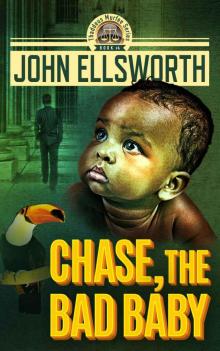 Chase, the Bad Baby: A Legal and Medical Thriller (Thaddeus Murfee Legal Thriller Series Book 4)
Chase, the Bad Baby: A Legal and Medical Thriller (Thaddeus Murfee Legal Thriller Series Book 4) The Girl Who Wrote The New York Times Bestseller: A Novel (Thaddeus Murfee Legal Thrillers Book 8)
The Girl Who Wrote The New York Times Bestseller: A Novel (Thaddeus Murfee Legal Thrillers Book 8) The Defendants: Crime Fiction & Legal Thriller (Thaddeus Murfee Legal Thriller Series Book 1)
The Defendants: Crime Fiction & Legal Thriller (Thaddeus Murfee Legal Thriller Series Book 1) Hellfire (Sisters In Law Book 2)
Hellfire (Sisters In Law Book 2) A Young Lawyer's story
A Young Lawyer's story Annie's Verdict (Michael Gresham Legal Thrillers Book 6)
Annie's Verdict (Michael Gresham Legal Thrillers Book 6) Legal Thriller: Michael Gresham: Secrets Girls Keep: A Courtroom Drama (Michael Gresham Legal Thriller Series Book 2)
Legal Thriller: Michael Gresham: Secrets Girls Keep: A Courtroom Drama (Michael Gresham Legal Thriller Series Book 2) 30 Days of Justis
30 Days of Justis Sakharov the Bear (Michael Gresham Legal Thrillers Book 5)
Sakharov the Bear (Michael Gresham Legal Thrillers Book 5)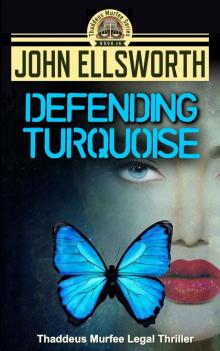 Defending Turquoise (Thaddeus Murfee Legal Thriller Series Book 5)
Defending Turquoise (Thaddeus Murfee Legal Thriller Series Book 5)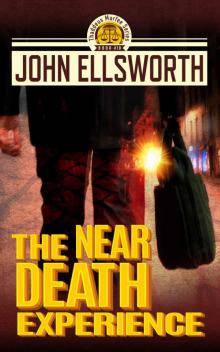 The Near Death Experience (Thaddeus Murfee Legal Thriller Series Book 10)
The Near Death Experience (Thaddeus Murfee Legal Thriller Series Book 10)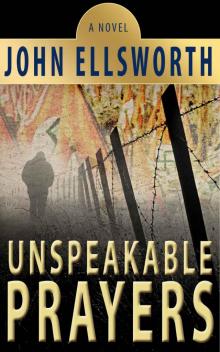 Unspeakable Prayers: WW II to Present Day (Thaddeus Murfee Series of Legal Thrillers)
Unspeakable Prayers: WW II to Present Day (Thaddeus Murfee Series of Legal Thrillers)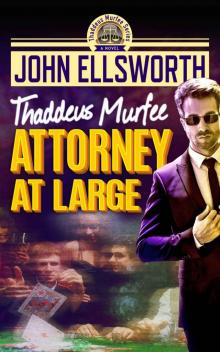 Attorney at Large (Thaddeus Murfee Legal Thriller Series Book 3)
Attorney at Large (Thaddeus Murfee Legal Thriller Series Book 3) The Law Partners (Michael Gresham Legal Thriller Series Book 3)
The Law Partners (Michael Gresham Legal Thriller Series Book 3) Annie's Verdict
Annie's Verdict The Mental Case (Thaddeus Murfee Legal Thriller Series Book 6)
The Mental Case (Thaddeus Murfee Legal Thriller Series Book 6)